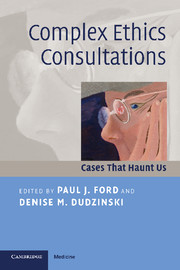Book contents
- Frontmatter
- Contents
- List of contributors
- Foreword
- Acknowledgments
- Introduction: Live and learn: courage, honesty, and vulnerability
- Part I Starting at the beginning: prenatal and neonatal issues
- Part II The most vulnerable of us: pediatrics
- 5 She was the life of the party
- 6 The sound of chains
- 7 Susie's voice
- 8 Access to an infant's family: lingering effects of not talking with parents
- Part III Diversity of desires and limits of liberty: psychiatric and psychological issues
- Part IV Withholding therapy with a twist
- Part V The unspeakable/unassailable: religious and cultural beliefs
- Part VI Human guinea pigs and miracles: clinical innovations and unorthodox treatment
- Part VII The big picture: organizational issues
- Conclusions, educational activities, and references
- Index
8 - Access to an infant's family: lingering effects of not talking with parents
Published online by Cambridge University Press: 03 May 2010
- Frontmatter
- Contents
- List of contributors
- Foreword
- Acknowledgments
- Introduction: Live and learn: courage, honesty, and vulnerability
- Part I Starting at the beginning: prenatal and neonatal issues
- Part II The most vulnerable of us: pediatrics
- 5 She was the life of the party
- 6 The sound of chains
- 7 Susie's voice
- 8 Access to an infant's family: lingering effects of not talking with parents
- Part III Diversity of desires and limits of liberty: psychiatric and psychological issues
- Part IV Withholding therapy with a twist
- Part V The unspeakable/unassailable: religious and cultural beliefs
- Part VI Human guinea pigs and miracles: clinical innovations and unorthodox treatment
- Part VII The big picture: organizational issues
- Conclusions, educational activities, and references
- Index
Summary
Narrative backstory
Before I arrived at my new institution, Baby Mo had been admitted at 6 weeks of age having endured an anoxic event of uncertain origin. Some speculated that his mom may have rolled over on him while sleeping, but nothing definitive was decided. This uncertainty led staff to speculate about the cause and the psychological motivations of the mother. The hypoxia was neurologically devastating, and the critical-care physicians initially believed Baby Mo would progress to brain death quickly. However, this did not occur. Although the physicians recommended “comfort care,” aggressive therapy was continued at the parents' insistence.
As care progressed, Baby Mo was stabilized to the point that eventual home care on a ventilator was foreseeable. In order to provide this long-term ventilation, a tracheostomy (trach) was required. The parents, who wanted Baby Mo to go home with them, did not want a trach. The clinical staff saw this stance as inconsistent and medically and ethically unwarranted because long-term ventilation could not be adequately performed without the trach. If long-term care was desired, then the staff simply could not have its hands tied in trying to provide optimal care. At the same time, staff members noted the irony of pushing for an invasive procedure for a patient who they believed should be allowed to die peacefully, without aggressive treatment.
This was the first time an ethics consult was called concerning Baby Mo. Again, this occurred before my employment when ethics consults were handled exclusively by the hospital ethics committee. The clinical staff and ethics committee agreed that given the desires expressed by the parents, and the needs of Baby Mo, a trach was a medical and ethical requirement.
- Type
- Chapter
- Information
- Complex Ethics ConsultationsCases that Haunt Us, pp. 66 - 72Publisher: Cambridge University PressPrint publication year: 2008



